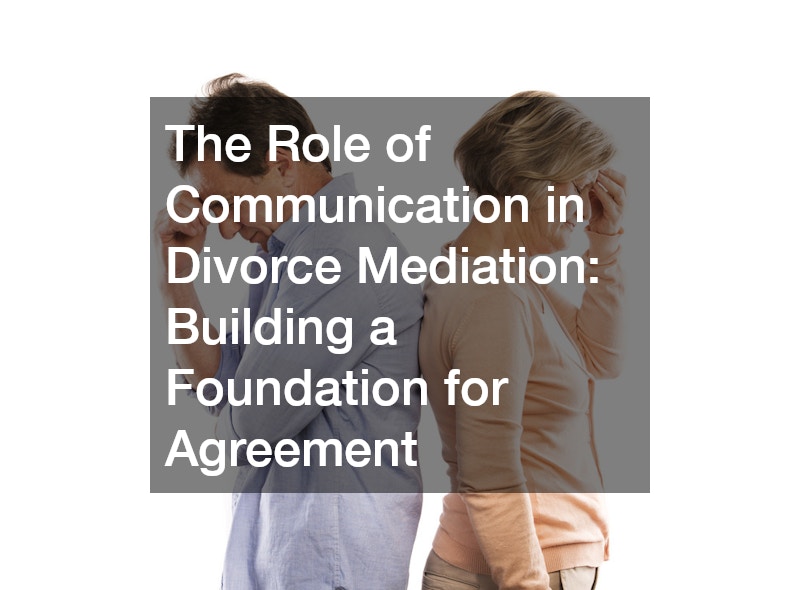Divorce is inherently challenging, often fraught with emotional turmoil, financial concerns, and logistical complexities. Amidst this, finding a path to amicable resolution can seem daunting. Divorce mediation service offers a viable alternative to contentious litigation, focusing on cooperation and mutual agreement. Central to the success of this process is effective communication.
This article explores the vital role of communication in divorce mediation and how it helps build a foundation for agreement.
Understanding Divorce Mediation
Divorce mediation is a process that helps divorcing couples negotiate and resolve disputes. Unlike a court setting, mediation emphasizes collaboration and empowers both parties to contribute to the final agreement. The goal is to reach a mutually acceptable solution, which can encompass everything from asset division to child custody arrangements. Effective communication is the bedrock of this process, enabling both parties to express their needs, understand each other’s perspectives, and find common ground.
The Importance of Communication in Mediation
Communication in divorce mediation is not just about talking; it involves active listening, empathy, and the ability to articulate one’s thoughts clearly. Here’s how effective communication contributes to successful mediation:
1. Clarifying Intentions and Expectations
One of the primary functions of communication in mediation is to clarify intentions and expectations. Misunderstandings and assumptions often fuel conflicts. By clearly stating their goals and concerns, both parties can prevent misinterpretations that could otherwise derail the mediation process.
2. Building Trust and Rapport
Effective communication helps build trust and rapport between the divorcing parties. When individuals feel heard and understood, they are more likely to engage in open and honest dialogue. This trust is crucial for negotiating fair terms and reaching a sustainable agreement.
3. Fostering Mutual Understanding
Mediation aims to foster mutual understanding. Through active listening and empathetic responses, each party can better understand the other’s viewpoint. This understanding is essential for finding compromises that respect both parties’ needs and preferences.
4. Reducing Emotional Tension
Divorce can evoke strong emotions such as anger, sadness, and frustration. Effective communication helps manage and reduce emotional tension. By expressing emotions constructively and listening to each other’s feelings, parties can diffuse conflicts and focus on problem-solving.
5. Facilitating Problem-Solving
Clear and constructive communication is key to effective problem-solving. By discussing issues openly and exploring various solutions, both parties can work collaboratively to resolve disputes. This approach increases the likelihood of reaching an agreement that satisfies both parties.
Strategies for Effective Communication in Mediation
To leverage the power of communication in divorce mediation, consider the following strategies:
1. Practice Active Listening
Active listening involves fully concentrating on what the other person is saying without interrupting or planning your response while they speak. Show that you are listening through non-verbal cues like nodding and maintaining eye contact. Reflect back what you’ve heard to ensure understanding.
2. Use “I” Statements
“I” statements help you express your feelings and needs without blaming or criticizing the other person. For example, instead of saying, “You never listen to me,” try, “I feel unheard when my opinions are dismissed.” This approach promotes constructive dialogue and helps reduce defensiveness.
3. Stay Calm and Respectful
Maintaining a calm and respectful demeanor is crucial, even when discussing contentious issues. Avoid raising your voice, using derogatory language, or interrupting the other person. Respectful communication fosters a positive environment conducive to negotiation.
4. Focus on Interests, Not Positions
In mediation, it’s essential to focus on underlying interests rather than fixed positions. Interests represent the needs and concerns that underlie each party’s stance. By exploring these interests, mediators can help parties find common ground and develop creative solutions.
5. Be Open to Compromise
Successful mediation requires a willingness to compromise. Recognize that both parties may need to make concessions to reach an agreement. Approach negotiations with an open mind and a readiness to explore various options.
6. Seek Emotional Support
Divorce can be emotionally draining. Consult a therapist or counselor so you can maintain emotional balance. Emotional stability enhances your ability to communicate effectively during mediation.
7. Prepare Thoroughly
Preparation is key to effective communication in mediation. Gather all relevant information, such as financial documents and custody schedules, and think about your goals and priorities. Being well-prepared helps you articulate your needs clearly and confidently.
Conclusion
Communication plays a pivotal role in divorce mediation, laying the foundation for mutual understanding and agreement. Through active listening, clear expression, and respectful dialogue, divorcing couples can navigate their differences and reach fair and sustainable resolutions. Divorce mediation services rely on these communication skills to transform potential conflicts into opportunities for collaboration. By focusing on effective communication, you can make the mediation process more productive and less adversarial, paving the way for a smoother transition into the next chapter of your life.
In essence, divorce mediation is a process that thrives on the quality of communication between the parties involved. Building a foundation for agreement through effective communication not only resolves immediate disputes but also sets a positive tone for future interactions, especially when children are involved. Embrace these strategies to make the most out of your divorce mediation service, ensuring a fair and amicable resolution.
.


